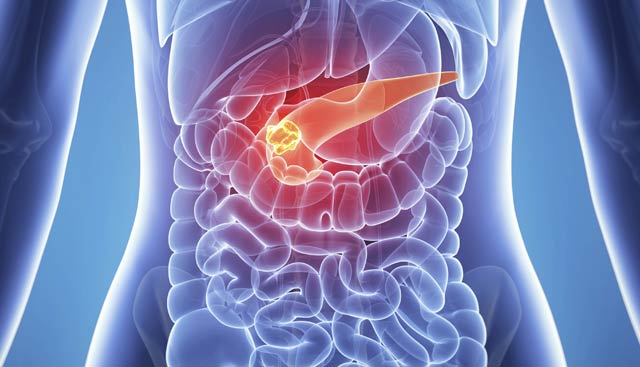
Identification of Targetable Gene Fusions Present in KRASWT Pancreatic Adenocarcinoma and the Response to Targeted Therapy
Pancreatic cancer is one of the leading causes of cancer-related deaths in the United States. The majority of patients with advanced or metastatic pancreas cancers develop disease progression within six months, resulting in the requirement for more effective therapies. Moffitt's Gastrointestinal Oncology Program is making novel advancements in treating pancreatic cancer and improving survival rate outcomes.
Recent trials have shown that alternative oncogenic drivers may be found in KRAS wild-type (KRASWT) pancreatic cancers. GI oncologist Dr. Dae Won Kim studied the incidence of targetable gene fusions present in KRASWT pancreatic adenocarcinoma and the response to targeted therapy.
The study presents 100 consecutive patients with pancreatic adenocarcinoma who underwent targeted next-generation sequencing using DNA sequencing with RNA sequencing (n = 47) or without RNA sequencing (n = 53) at a single institution. The frequency and landscape of targetable fusions in KRASWT pancreatic adenocarcinoma were characterized and compared with the frequency of fusions in KRASmutated (KRASMUT) pancreatic adenocarcinoma. Results were then validated in two independent cohorts using data from AACR GENIE (n = 1,252) and TCGA (n = 150).
Results presented that pancreatic cancers from 13 of 100 patients (13%) were found to be KRASWT. Targetable fusions were identified in 4/13 (31%) KRASWT tumors compared with 0/87 (0%) KRAS MUT pancreatic adenocarcinomas (P = .0002). One of the 100 patients with a novel MET fusion presented a complete response to targeted therapy with crizotinib that is ongoing at 12+ months of treatment. Of the validation cohorts, gene fusions were identified in 18/97 (19%) and 2/10 (20%) KRASWT tumors reported in the AACR GENIE and TCGA cohorts, respectively.
Conclusions from this study showed Oncogene fusions are present in KRASWT pancreatic adenocarcinomas at an increased frequency when compared with KRASMUT pancreatic adenocarcinomas. As these fusions may be susceptible to targeted therapy, molecular analyses for the detection of fusions in KRASWT pancreatic adenocarcinomas may warrant increased consideration.
Read the full abstract.
If you'd like to refer a patient to Moffitt Cancer Center, complete our online form or contact a physician liaison for assistance. As part of our efforts to shorten referral times as much as possible, online referrals are typically responded to within 24 - 48 hours.
